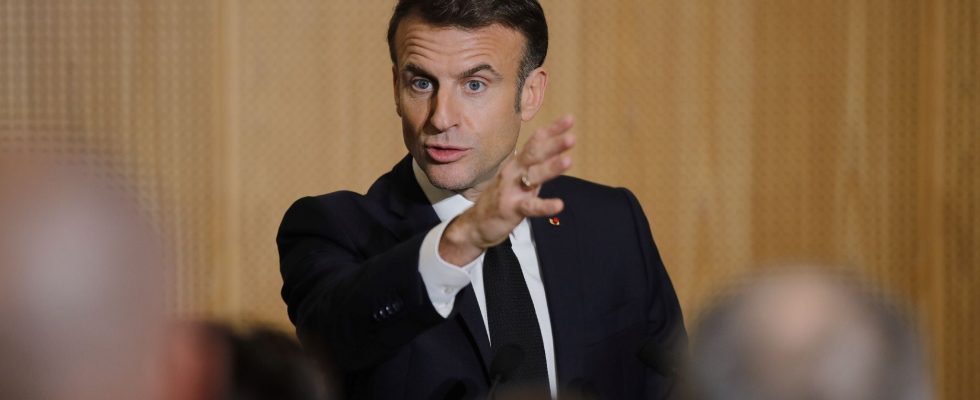The closer the deadline approaches, the less we believe in it. Emmanuel Macron has set the bar very high: the head of state made the almost sacred promise that France would reach full employment in 2027, at the conclusion of his second and final five-year term. A commitment, repeated over and over again, which took a serious blow when INSEE published, in mid-November, an unemployment rate of 7.4% in the third quarter, up 0.2 points compared to in the previous quarter, far, very far still, from the 5% targeted by the government to reach the much-hoped-for holy grail.
Immediate reaction, a few days later, from the President of the Republic. In front of an audience of business leaders, Emmanuel Macron launched a vibrant “Wake up”, without us really knowing whether the call was intended for the social partners or the bosses. Or everyone. “If this was said towards companies, it is a bad diagnosis. They have hired a lot over the last four years, when they should have been laying off people. The problem is not there,” judges a labor market specialist.
2024 does not bode well
Sudden concern or political will to step on the accelerator? The objective of full employment in 2027 in any case seems to be moving away. Especially since the situation could still get worse. The Banque de France forecasts an unemployment rate of 7.5% in 2024. The following year, it would even reach 7.8%. “If we are at 8% at the end of 2024, we will not be able to go down to 5%,” predicts Eric Heyer, director of the Analysis and Forecasting department of the OFCE. Emmanuel Macron, however, seemed well on his way to winning his bet. When he came to power in 2017, the unemployment rate stood at 9.5%. In the meantime, several crises have weakened the labor market.
Paul Christophe, Horizons du Nord MP, who was the co-rapporteur of the Full Employment bill adopted by Parliament on November 14, wants to believe in the lucky star of the Head of State. “This objective is still relevant today. It is long-term and above all it cannot be decreed. It is a sum of converging actions which will allow us to achieve full employment”, believes the elected official. . The reform must in any case produce its effects. “Only 26% of job advertisements go through Pôle emploi. There is a lack of connection. The role of France Travail will be to identify the offers as closely as possible”, mentions for example the elected official among the sites involved. “It will have no impact,” says Eric Heyer dryly.
Working on job quality
Obstacles on the winding road to full employment are multiplying. The pace of growth, first of all, does not make the executive’s business easier. “Household consumption is not picking up and savings rates are at historic levels. There is even oversaving,” emphasizes Eric Heyer. In addition, “company order books are flat. Just a year ago, when we questioned managers, the main obstacle was supply, then recruitment and finally demand. Today in the surveys, there is no longer a supply problem, the first blockage is demand,” points out the specialist.
Added to this is a good dose of economic uncertainty. “Everything will depend on the economic situation and the evolution of growth in France. Without any particular shock, we can imagine that we will reach full employment in 2027, but this is absolutely not certain,” warns the economist Christine Erhel. She calls for a change in software: “Today we have reached the limit of this type of policy. The question is to work on the quality of jobs and not the number. If we want to have more innovation, productivity gains and develop new activities linked to the transition, it is important not to think only in terms of full employment.
After 2027?
For Alexandra Roulet, professor of economics at INSEAD and former advisor on macroeconomic issues to Emmanuel Macron, full employment remains a realistic objective… but not by 2027. “The government has chosen to make reforms that increase gradually, such as that of pensions. These are not solutions with immediate effect. The objective being to move towards sustainable full employment”, explains the expert, before concluding: “It will be necessary truly judge the results, the true macroeconomic results, on a slightly more distant horizon.”
For the government, there is no question of giving up. In Matignon and in the ministries, there has been an uproar for several days. Ministers and advisors are thinking about new reforms. “We must continue to do so if we want to get there by 2027,” assures Eric Chevée, vice-president in charge of Social Affairs at the CPME. Same story with Medef, which wants to “enable companies to recruit better”. Bruno Le Maire is already out of the woods on the subject. The Minister of the Economy recently proposed aligning the duration of compensation for unemployed people over 55 with that of other job seekers. Measure in favor of full employment or budgetary scheme? The future will tell.
The employment of seniors remains the crux of the matter. The frames market is the perfect illustration of this. “There is this paradox in France between, on the one hand, a dynamic executive market with high recruitment pressures and a pool of skills available among seniors. There are today nearly 100,000 registered with Pôle emploi, including a large number majority are in a financial emergency to work again”, recalls Pierre Lamblin, director of studies and data at Apec, the Association for Executive Employment. In the coming weeks the social partners will have to “find new and ambitious solutions”, asked Prime Minister Elisabeth Borne. “To improve the employment rate of seniors, this will require a proactive social and economic policy, and therefore… expenditure,” already warns Olivier Guivarch, national secretary for employment policies at the CFDT. Problem is, during a budgetary diet, the word expenditure is banned from government vocabulary.
.
